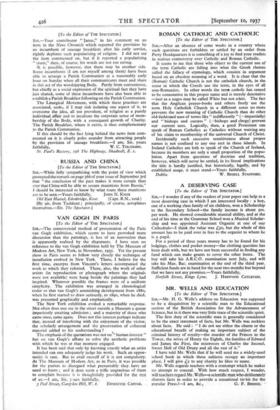ROMAN CATHOLIC AND CATHOLIC [To the Editor of THE SPECTATOR.]
Sta,—After an absence of some weeks in a country where such questions are forbidden or settled by an order from Party Headquarters it is something of a joy to find your readers in zealous controversy over Catholic and Roman Catholic.
It seems to me that those who object to the current usenf the term Catholic are falling into what the Greek rhetors called the fallacy of etymology, which consists in argument based on an obsolete meaning of a word. It is clear that the (Roman) Catholic Church is not the catholick church, in the sense in which the Creeds use the term, in the eyes of all non-Romanists. In other words the ternt catholic has ceased to be connotative in this proper name and is merely denotative —just as a negro may be called White but not white. The fact that the Anglican prayer-books and others freely • use the term Holy Catholick Church in a different sense no more prevents the new meaning of Catholic Church than do other old-fashioned uses of terms like " indifferently " (=impartially) and "bishops and curates" (=bishops and clergy) prevent our current uses. Logically, then, a good Protestant can speak of Roman Catholics as Catholics without waiving any of his claim to membership of the universal Church of Christ.
Incidentally such excessive sensitiveness about proper names is not confined to any one sect in these islands. In Ireland Catholics are loth to speak of the Church of Ireland, because its members are only a small proportion of the popu- lation. Apart from questions of doctrine and tradition, however, which will never be settled, in its literal implications the title is hardly justified, but historically, legally, and by established usage, it must stand.—Yours faithfully,










































 Previous page
Previous page